Related Research Articles

The German Empire or the Imperial State of Germany, also referred to as Imperial Germany or simply Germany, was the period of the German Reich from the unification of Germany in 1871 until the November Revolution in 1918, when the German Reich changed its form of government from a monarchy to a republic.

Otto Eduard Leopold, Prince of Bismarck, Duke of Lauenburg, known as Otto von Bismarck, was a conservative German statesman who masterminded the unification of Germany in 1871 and served as its first chancellor until 1890, in which capacity he dominated European affairs for two decades. He had previously been Minister President of Prussia (1862–1890) and Chancellor of the North German Confederation (1867–1871). He provoked three short, decisive wars against Denmark, Austria, and France. Following the victory against Austria, he abolished the supranational German Confederation and instead formed the North German Confederation as the first German national state, aligning the smaller North German states behind Prussia. Receiving the support of the independent South German states in the Confederation's defeat of France, he formed the German Empire and united Germany.
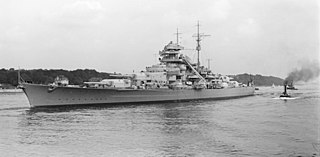
Bismarck was the first of two ‹See TfM›Bismarck-class battleships built for Nazi Germany's Kriegsmarine. Named after Chancellor Otto von Bismarck, the ship was laid down at the Blohm & Voss shipyard in Hamburg in July 1936 and launched in February 1939. Work was completed in August 1940, when she was commissioned into the German fleet. Bismarck and her sister ship Tirpitz were the largest battleships ever built by Germany, and two of the largest built by any European power.
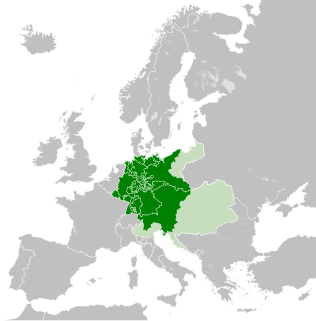
The German Confederation was an association of 39 predominantly German-speaking sovereign states in Central Europe, created by the Congress of Vienna in 1815 as a replacement of the former Holy Roman Empire, which had been dissolved in 1806. The German Confederation did not include certain German-speaking lands in the eastern portion of the Kingdom of Prussia, the German-speaking cantons of Switzerland, and the French region of Alsace, which was predominantly German-speaking.
The welfare state is a form of government in which the state protects and promotes the economic and social well-being of the citizens, based upon the principles of equal opportunity, equitable distribution of wealth, and public responsibility for citizens unable to avail themselves of the minimal provisions for a good life. Sociologist T. H. Marshall described the modern welfare state as a distinctive combination of democracy, welfare, and capitalism.
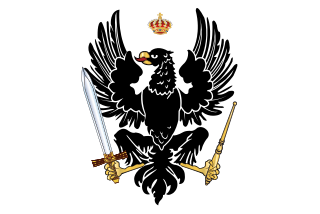
The Kingdom of Prussia was a German kingdom that constituted the state of Prussia between 1701 and 1918. It was the driving force behind the unification of Germany in 1871 and was the leading state of the German Empire until its dissolution in 1918. Although it took its name from the region called Prussia, it was based in the Margraviate of Brandenburg, where its capital was Berlin.

The North German Confederation was the German federal state which existed from July 1867 to December 1870. Although de jure a confederacy of equal states, the Confederation was de facto controlled and led by the largest and most powerful member, Prussia, which exercised its influence to bring about the formation of the German Empire. Some historians also use the name for the alliance of 22 German states formed on 18 August 1866. In 1870–1871, the south German states of Baden, Hesse-Darmstadt, Württemberg and Bavaria joined the country. On 1 January 1871, the country adopted a new constitution, which was written under the title of a new "German Confederation" but already gave it the name "German Empire" in the preamble and article 11.
Kulturkampf is a German term referring to the conflict between the government of the Kingdom of Prussia and the Roman Catholic Church from about 1872 to 1878, predominantly over the control of educational and ecclesiastical appointments. What made the Kulturkampf unique in Germany compared to struggles between state and Church in other states was its anti-Polish aspect.
The National Liberal Party was a liberal party of the North German Confederation and the German Empire which flourished between 1867 and 1918.
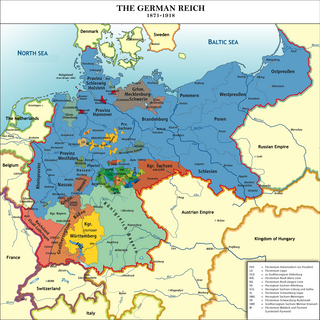
The Unification of Germany into the German Empire, a Prussia-dominated state with federal features, was officially proclaimed on 18 January 1871 in the Hall of Mirrors at the Palace of Versailles in France. The new state replaced the German Confederation, a loose association of sovereign states, and the highly decentralized Holy Roman Empire. Princes of the German states, excluding Austria-Hungary and its House of Habsburg-Lorraine, gathered at the ceremony to proclaim William I of Prussia and the House of Hohenzollern as German Emperor, following the French capitulation in the Franco-Prussian War.

German nationalism is an ideological notion that promotes the unity of Germans and German-speakers into a nation state. German Nationalism emphasizes and takes pride in the national identity of Germans. The earliest origins of German nationalism began with the birth of romantic nationalism during the Napoleonic Wars when Pan-Germanism started to rise. Advocacy of a German nation-state began to become an important political force in response to the invasion of German territories by France under Napoleon.
State Socialism was a set of social programmes implemented in the German Empire that were initiated by Otto von Bismarck in 1883 as remedial measures to appease the working class and detract support for socialism and the Social Democratic Party of Germany following earlier attempts to achieve the same objective through Bismarck's Anti-Socialist Laws. As a term, it was coined by Bismarck's liberal opposition to these social welfare policies, but it was later accepted by Bismarck. This did not prevent the Social Democrats to become the biggest party in the Reichstag by 1912. According to historian Jonathan Steinberg, "[a]ll told, Bismarck's system was a massive success—except in one respect. His goal to keep the Social Democratic Party out of power utterly failed. The vote for the Social Democratic Party went up and by 1912 they were the biggest party in the Reichstag".
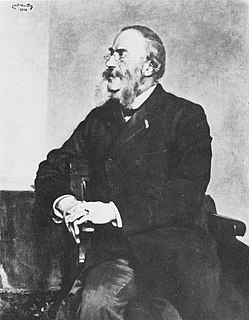
Gerson von Bleichröder was a Jewish German banker.

Carl-Eduard Otto Wolfgang Jayme Anders von Bismarck-Schönhausen, often known as "Calle" von Bismarck, is a German politician (CDU). He served as a member of the Bundestag from 2005 to 2007. A member of the princely House of Bismarck, he succeeded his father as the 5th Prince of Bismarck in 2019.
The Borussian myth or Borussian legend is the name given by 20th-century historians of German history to the earlier idea that German unification was inevitable, and that it was Prussia's destiny to accomplish it. The Borussian myth is an example of a teleological argument. Borussia is the Latin name for Prussia.
National Economic Council may refer to:
Preußentum und Sozialismus is a book by Oswald Spengler published in 1919 that addressed the connection of the Prussian character with right-wing socialism.
Paternalistic conservatism is a strand of conservatism which reflects the belief that societies exist and develop organically and that members within them have obligations towards each other. There is particular emphasis on the paternalistic obligation of those who are privileged and wealthy to the poorer parts of society. Consistent with principles such as duty, hierarchy and organicism, it can be seen an outgrowth of traditionalist conservatism. Paternal conservatives support neither the individual nor the state in principle, but are instead prepared to support either or recommend a balance between the two depending on what is most practical.
State socialism is a political and economic ideology within the socialist movement advocating state ownership of the means of production, either as a temporary measure or as a characteristic of socialism in the transition from the capitalist to the socialist mode of production or communist society. Aside from anarchists and other libertarian socialists, there was confidence amongst socialists in the concept of state socialism as being the most effective form of socialism. Some early social democrats in the late 19th century and early 20th century such as the Fabians claimed that British society was already mostly socialist and that the economy was significantly socialist through government-run enterprises created by conservative and liberal governments which could be run for the interests of the people through their representatives' influence, an argument reinvoked by some socialists in post-war Britain. State socialism went into decline starting in the 1970s, with the discovery of stagflation during the 1970s energy crisis, the rise of neoliberalism and later with the fall of state socialist regimes in the Eastern Bloc during the Revolutions of 1989 and the fall of the Soviet Union.
The French indemnity was the indemnity the French Third Republic paid to the German Empire after the French defeat in the Franco-Prussian War in 1871.
References
- ↑ Craig, Gordon Alexander (1978). Germany, 1866-1945 . Oxford: Oxford University Press. p. 157.